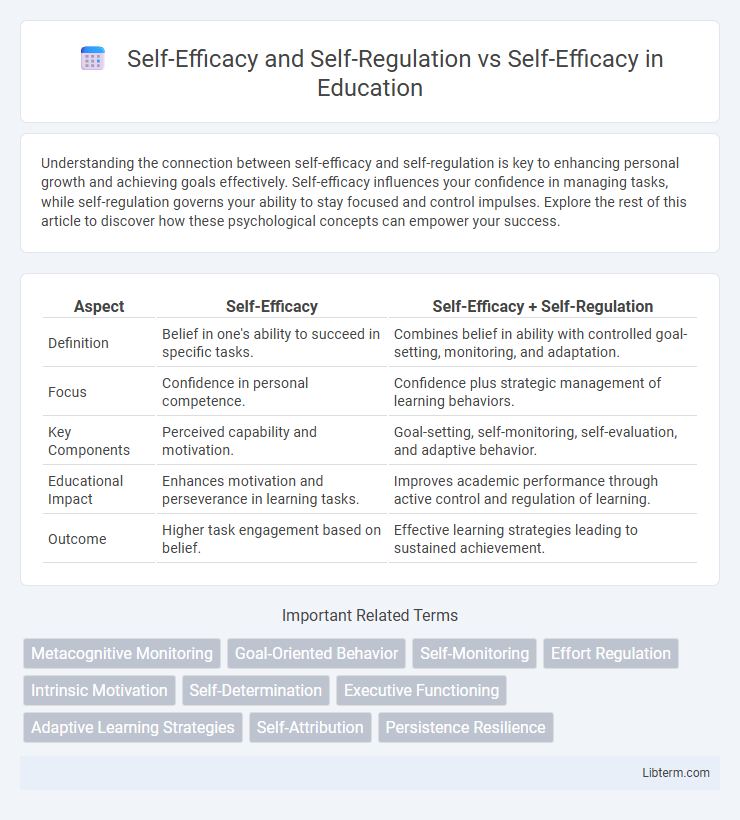Understanding the connection between self-efficacy and self-regulation is key to enhancing personal growth and achieving goals effectively. Self-efficacy influences your confidence in managing tasks, while self-regulation governs your ability to stay focused and control impulses. Explore the rest of this article to discover how these psychological concepts can empower your success.
Table of Comparison
| Aspect | Self-Efficacy | Self-Efficacy + Self-Regulation |
|---|---|---|
| Definition | Belief in one's ability to succeed in specific tasks. | Combines belief in ability with controlled goal-setting, monitoring, and adaptation. |
| Focus | Confidence in personal competence. | Confidence plus strategic management of learning behaviors. |
| Key Components | Perceived capability and motivation. | Goal-setting, self-monitoring, self-evaluation, and adaptive behavior. |
| Educational Impact | Enhances motivation and perseverance in learning tasks. | Improves academic performance through active control and regulation of learning. |
| Outcome | Higher task engagement based on belief. | Effective learning strategies leading to sustained achievement. |
Understanding Self-Efficacy: Definition and Importance
Self-efficacy refers to an individual's belief in their ability to execute specific tasks successfully, significantly influencing motivation, learning, and performance outcomes. It plays a critical role in self-regulation by impacting how people set goals, monitor progress, and adjust behaviors to achieve desired results. Understanding self-efficacy is essential for developing effective interventions that promote resilience, persistence, and adaptive coping strategies in various domains such as education, health, and workplace performance.
Exploring Self-Regulation: Concepts and Processes
Self-regulation involves managing thoughts, emotions, and behaviors to achieve personal goals, functioning as a dynamic process influenced by self-efficacy beliefs. It encompasses setting standards, monitoring progress, and adjusting actions to maintain motivation and performance. Understanding self-regulation highlights how individuals with strong self-efficacy effectively apply strategies to control impulses and persist through challenges.
Key Differences Between Self-Efficacy and Self-Regulation
Self-efficacy refers to an individual's belief in their capability to execute specific tasks successfully, while self-regulation involves the ability to control and manage one's behavior, emotions, and thoughts to achieve long-term goals. The key difference lies in self-efficacy serving as a motivational foundation that influences confidence and effort, whereas self-regulation encompasses strategies such as goal-setting, monitoring, and self-discipline to maintain focus and persistence. Understanding these distinctions is crucial for developing effective interventions in education, psychology, and personal development.
How Self-Efficacy Influences Self-Regulation
Self-efficacy significantly influences self-regulation by enhancing an individual's confidence in their ability to manage and control their behaviors, emotions, and thoughts to achieve specific goals. High self-efficacy fosters stronger motivation, persistence, and effective goal-setting, which are critical components of successful self-regulation strategies. Research indicates that individuals with greater self-efficacy demonstrate better self-monitoring and adaptive responses to challenges, leading to improved task performance and emotional resilience.
The Synergistic Relationship: Self-Efficacy and Self-Regulation Combined
Self-efficacy and self-regulation form a synergistic relationship essential for effective goal attainment and personal growth. High self-efficacy enhances an individual's ability to self-regulate by increasing motivation, persistence, and strategic planning during task execution. The dynamic interaction between self-efficacy beliefs and self-regulatory processes leads to improved performance, adaptive behavior, and resilience in the face of challenges.
Measuring Self-Efficacy and Self-Regulation in Daily Life
Measuring self-efficacy and self-regulation in daily life involves assessing individuals' confidence in managing tasks and their ability to control emotions, behaviors, and thoughts in various situations. Tools such as self-report questionnaires, ecological momentary assessments, and behavioral observations capture fluctuations in self-efficacy beliefs and self-regulatory strategies across contexts. Validated scales like the General Self-Efficacy Scale and the Self-Regulation Questionnaire enable reliable tracking of these constructs, informing interventions aimed at enhancing personal goal achievement and adaptive functioning.
Developing Self-Efficacy: Practical Strategies
Developing self-efficacy involves targeted practices such as setting achievable goals, seeking constructive feedback, and engaging in reflective self-assessment. Incorporating self-regulation techniques like goal setting, self-monitoring, and adaptive adjustment enhances the effectiveness of building self-efficacy by fostering persistence and resilience. Practical strategies include visualization of successful outcomes, mastery experiences through incremental challenges, and leveraging social modeling to reinforce confidence and competence.
Enhancing Self-Regulation Skills: Effective Approaches
Enhancing self-regulation skills involves targeted strategies such as goal-setting, self-monitoring, and cognitive restructuring to improve focus and persistence. Integrating self-efficacy strengthens motivation by fostering belief in one's capability to manage tasks and challenges effectively. Research indicates that combining self-efficacy with self-regulation techniques leads to higher academic achievement and better emotional control.
Impact of Self-Efficacy vs. Self-Efficacy with Self-Regulation on Success
Self-efficacy alone significantly influences motivation and perseverance, directly impacting individual success by fostering belief in one's capabilities. When combined with self-regulation, which involves goal-setting, self-monitoring, and adaptive strategies, self-efficacy's effect on success is amplified through enhanced behavioral control and sustained effort. Research indicates that individuals exhibiting high self-efficacy coupled with strong self-regulation skills achieve better academic, professional, and personal outcomes compared to those relying solely on self-efficacy.
Applications in Education, Work, and Personal Growth
Self-efficacy enhances motivation and persistence by fostering belief in one's capabilities, while self-regulation involves managing behaviors and emotions to achieve goals, both crucial in education for improving academic performance and in work settings for boosting productivity and resilience. In personal growth, self-efficacy empowers individuals to tackle challenges confidently, whereas self-regulation ensures sustained effort and adaptive strategies to maintain progress. Integrating self-efficacy with self-regulation strategies optimizes learning outcomes, career development, and emotional well-being through targeted goal-setting and continuous self-assessment.
Self-Efficacy and Self-Regulation Infographic

 libterm.com
libterm.com